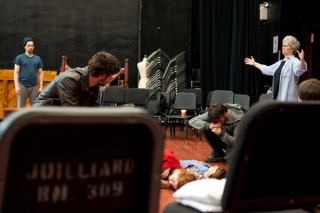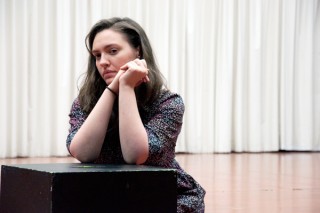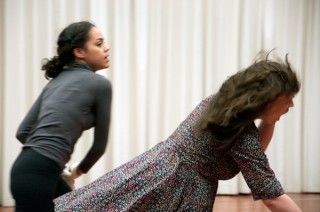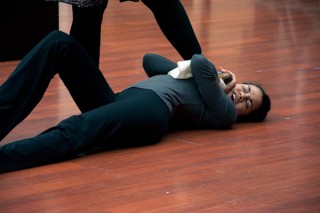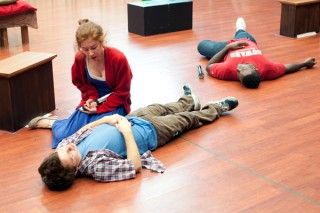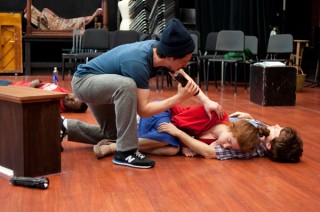 Illuminating Shakespeare Rep
Illuminating Shakespeare Rep M.L.K. 20: Dr. King's Message in Words, Dance, and Song
M.L.K. 20: Dr. King's Message in Words, Dance, and Song Celebrating the Life of an Extraordinary Musician
Celebrating the Life of an Extraordinary Musician Orientation Provides a Warm 'Welcome!' for New Students
Orientation Provides a Warm 'Welcome!' for New Students Recent Events for April 2010
Recent Events for April 2010 Recent Events for March 2012
Recent Events for March 2012 Recent Events for February 2012
Recent Events for February 2012 Recent Events for December 2011-January 2012
Recent Events for December 2011-January 2012 Recent Events for November 2011
Recent Events for November 2011 Recent Events for October 2011
Recent Events for October 2011 Recent Events for September 2011
Recent Events for September 2011 Recent Events for April 2011
Recent Events for April 2011 Recent Events for March 2011
Recent Events for March 2011 Recent Events for February 2011
Recent Events for February 2011 Recent Events for March 2010
Recent Events for March 2010 Recent Events for December 2009-January 2010
Recent Events for December 2009-January 2010 Recent Events for November 2009
Recent Events for November 2009 Recent Events for October 2009
Recent Events for October 2009 Recent Events for September 2009
Recent Events for September 2009 Recent Events for April 2009
Recent Events for April 2009 Recent Events for May 2017
Recent Events for May 2017 Recent Events for April 2017
Recent Events for April 2017 Recent Events for March 2017
Recent Events for March 2017 Recent Events for February 2017
Recent Events for February 2017 Recent Events Dec. 2016-Jan. 2017
Recent Events Dec. 2016-Jan. 2017 Choreographers and Composers Create
Choreographers and Composers Create Recent Events November 2016
Recent Events November 2016 Orientation and Convocation 2016
Orientation and Convocation 2016 Recent Events for September 2016
Recent Events for September 2016 Recent Events for May 2016
Recent Events for May 2016 Recent Events for April 2016
Recent Events for April 2016 Recent Events for March 2016
Recent Events for March 2016 Recent Events for February 2016
Recent Events for February 2016 Recent Events for December-January 2015-16
Recent Events for December-January 2015-16 Rehearsing Yasmina Reza’s 'God of Carnage'
Rehearsing Yasmina Reza’s 'God of Carnage' Recent Events for November 2015
Recent Events for November 2015 Recent Events for October 2015
Recent Events for October 2015 Recent Events for September 2015
Recent Events for September 2015 Juilliard Celebrates the Class of 2015
Juilliard Celebrates the Class of 2015 Recent Events for May 2015
Recent Events for May 2015 Recent Events for April 2015
Recent Events for April 2015 Recent Events for March 2015
Recent Events for March 2015 Recent Events for February 2015
Recent Events for February 2015 Third-Years' "The Frogs"
Third-Years' "The Frogs" Recent Events for December 2014
Recent Events for December 2014 Recent Events for November 2014
Recent Events for November 2014 Recent Events for October 2014
Recent Events for October 2014 Recent Events for September 2014
Recent Events for September 2014 Juilliard Celebrates 109th Commencement
Juilliard Celebrates 109th Commencement Highlights of 2013-14 in Pictures
Highlights of 2013-14 in Pictures Recent Events for April 2014
Recent Events for April 2014 Recent Events for March 2014
Recent Events for March 2014 Recent Events for February 2014
Recent Events for February 2014 Alumni Recent Events
Alumni Recent Events Recent Events for December 2013-January 2014
Recent Events for December 2013-January 2014 Recent Events for November 2013
Recent Events for November 2013 Recent Events for October 2013
Recent Events for October 2013 Recent Events for September 2013
Recent Events for September 2013 2012-13: A Year in Pictures
2012-13: A Year in Pictures Recent Events for April 2013
Recent Events for April 2013 Recent Events for November 2012
Recent Events for November 2012 Rebuilding Ground Zero
Rebuilding Ground Zero Recent Events for March 2013
Recent Events for March 2013 25 Years of M.L.K. at Juilliard
25 Years of M.L.K. at Juilliard Recent Alumni Events 2013
Recent Alumni Events 2013 Recent Events for October 2012
Recent Events for October 2012 Recent Events for December 2012-January 2013
Recent Events for December 2012-January 2013 Superstorm Sandy: The Aftermath
Superstorm Sandy: The Aftermath Recent Events for February 2013
Recent Events for February 2013 Rebuilding Ground Zero
Rebuilding Ground Zero Recent Events for December 2010/January 2011
Recent Events for December 2010/January 2011 Recent Events for April 2012
Recent Events for April 2012 Recent Events for September 2010
Recent Events for September 2010 Recent Events for November 2010
Recent Events for November 2010 Looking Back at 2008-2009
Looking Back at 2008-2009 Looking Back at 2009-2010
Looking Back at 2009-2010 2010-2011: A Year in Pictures
2010-2011: A Year in Pictures 2011-12: A Year in Pictures
2011-12: A Year in Pictures Recent Events for September 2012
Recent Events for September 2012 Summer Jazz Camps Serve 300 Young Students
Summer Jazz Camps Serve 300 Young Students Recent Events for December 2010
Recent Events for December 2010 Recent Events for November for 2010
Recent Events for November for 2010 Recent Events for October 2010
Recent Events for October 2010 Recent Events for February 2010
Recent Events for February 2010 In New Orleans, Students Lend Hands, Hearts, and Minds
In New Orleans, Students Lend Hands, Hearts, and Minds Alumni Recent Events 2009
Alumni Recent Events 2009 At Orientation, Frolic and New Friendships
At Orientation, Frolic and New Friendships Settling In: New Students Arrive and Thrive
Settling In: New Students Arrive and Thrive Summer Dance Intensive 2011: Energy, Rigor, Commitment
Summer Dance Intensive 2011: Energy, Rigor, Commitment Commencement 2011: John Adams Addresses the Newest...
Commencement 2011: John Adams Addresses the Newest... Building in the Big Easy: ARTreach New Orleans Turns 5
Building in the Big Easy: ARTreach New Orleans Turns 5 Recent Alumni Events 2011
Recent Alumni Events 2011 New Students Get Acquainted and Explore the Big Apple
New Students Get Acquainted and Explore the Big Apple Alumni Reconnect
Alumni Reconnect Joseph W. Polisi: 25 Years in Pictures
Joseph W. Polisi: 25 Years in Pictures Elliott Carter at 99
Elliott Carter at 99 Gala Celebrates 25th Anniversary of Polisi Presidency
Gala Celebrates 25th Anniversary of Polisi Presidency Celebrating the Legacy of M.L.K.: Why We Can’t Wait
Celebrating the Legacy of M.L.K.: Why We Can’t Wait M.L.K. 2009: A Legacy of Hope
M.L.K. 2009: A Legacy of Hope Juilliard in Aiken Festival a Success
Juilliard in Aiken Festival a Success
Each spring, the third-year drama students perform two Shakespeare plays in repertory (May 9-19), leaving lesser mortals to wonder, how do they manage to memorize all that Shakespeare and not get confused? Journal editor Susan Jackson interviewed three of the actors about the process of preparing for two very different parts in very different plays: Romeo and Juliet and The Taming of the Shrew.
Ali Sohaili plays Romeo’s friend Mercutio in Romeo and Juliet and Grumio, a servant in The Taming of the Shrew.
There are some basic differences between these characters: one is old and one is young, so there’s a difference of physicality and even in their vocal rhythms. Mercutio’s a somewhat bipolar young man who’s grappling with sexual identity and all kinds of things. It’s exhausting, the amount of energy and focus you put into that. And the dying. Dying is tiring. Grumio is fun, but being a servant is difficult for its own reasons. I’m kind of hunched over and getting beaten up all the time, so that can be tiring too.
Grumio’s lines are so literal. He’s not the brightest guy in the world, and he’s a little devious. He uses a lot of monosyllabic words, so anytime he uses multisyllabic words, you know that’s a big deal, even if it doesn’t seem like a very important word. He also uses the wrong words at certain times, which gives you insight into his character.
One pattern that I find cool with Mercutio is that he uses the words “I” and “eye” a lot—the man’s kind of obsessed with himself. The more you see these patterns, the more you realize that you can make choices that probably are closer to what Shakespeare intended.
I was here during spring break building the Globe [the set for both plays]. I love working with my hands. But to build the set that you’re going to perform on—you don’t get that opportunity too much. On our breaks, I would look up and imagine standing up there onstage with the seats full of people.
Katharine Robinson plays Katharina (Kate) in The Taming of the Shrew and Juliet’s cousin Tybalt in Romeo and Juliet.
More than anything it’s trying to figure out the differences and nuances between these two characters, because they’re both pretty quick and hot-tempered and on the attack.
Shakespeare is so specific with his word choice. For each character, I ask, why do I use these words? A lot of that comes out in terms of how characters use images. Some, like Romeo, live in flowery images. Whereas Tybalt doesn’t come up with imagery. And Kate tends not to use a lot of metaphors or imagery either, although she does use a lot of word play. And when the rhythm is stretched or there’s an extra beat or a missing beat, you realize, oh, there’s something there.
To me Shakespeare is really easy to memorize, I think because of the way the text scans. And he gives you a lot of the thoughts in the language—it’s not like modern texts a lot of the time, when you might have a thought that you have to connect eight different ways before you get to what you say. And it’s also so rhythmical and musical, which really helps.
I haven’t said the wrong line in the wrong play—yet! Sometimes I’m afraid I’m going to go into the wrong fight, but so far I’ve done O.K.
The plays are so different, it’s kind of incredible. They’re almost opposite worlds in their ideas of honor and love. I mean every play ever pretty much deals with love. But it’s interesting how one writer can flip it and look at it in such different ways. Taming is a really hard story to reconcile. In this play you can’t win as a woman.
Adam Farabee plays Romeo in Romeo and Juliet and a befuddled merchant in The Taming of the Shrew.
I’ve never started saying the wrong lines in the wrong play, but there’ll be moments when I’ll say, “wait, is that the line that I say when I’m the merchant, or is that Romeo?” And these words will start popping out of my head: forsooth, alack.
The biggest difference between these characters is their energy. Romeo is a teenager, so whatever he believes is fully felt. When he’s in love with Rosaline [when the play begins], it’s the most painful, terrible thing ever that she doesn’t return his love. And then he sees Juliet and completely falls in love with her. It’s exhausting keeping up with the fullness of his passion. The merchant in Taming is extremely comedic—and he’s not the brightest one on the block.
I get to use so many different sides of myself doing these two plays. I get to explore my whole range as an actor. But it’s not just about you and the part you happen to be playing, because we’re all given extreme challenges. It’s about how do I help tell this story that we’ve decided on as a group. That’s kind of freeing, because it becomes less about you and more about the work.
I give myself half an hour for stretching and vocalizing so that I’m ready to go on without tension. And then I let myself start imagining, what has my character been doing this morning? Where have I been? Where am I going? I’m not thinking about technical things once I walk on stage.
In Romeo and Juliet, Adam Farabee’s Romeo kills Katharine Robinson’s Tybalt.
Adam: In Romeo and Juliet, we just have that really important scene—
Katharine: —and then I die.
Adam: When you read the play, all that’s given to you is “they fight.” But the story that’s being told of that fight is huge—
Katharine: —especially for Tybalt. I think I have 10 lines in the play, but I’m in three scenes, two of which are fight scenes.
Adam: I come into that scene with a strong reason [Juliet] I don’t want to fight, and I try to break up the first fight between Mercutio and Tybalt, but I get involved and that leads to all this terrible stuff happening. And while 15 lines ago I was saying, I’m not going to fight, then my best friend dies—
Katharine: Everything in this plays happens in a split second—and then everything changes.

